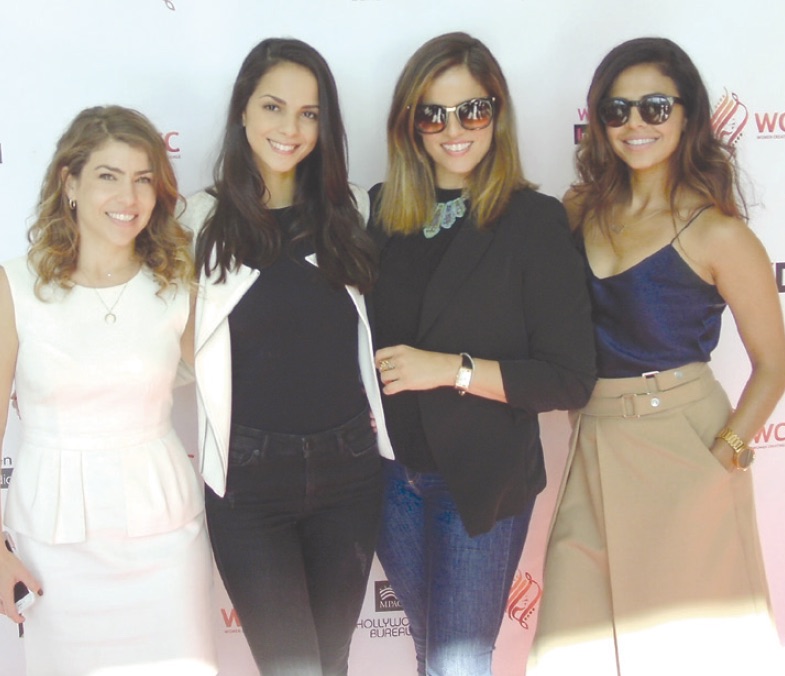 From left: Lee Broda, Shani Atias,
Noa Tishby, Azita Ghanizada. Photo by Gerri Miller
From left: Lee Broda, Shani Atias,
Noa Tishby, Azita Ghanizada. Photo by Gerri Miller Stories of sexual misconduct and abuse, workplace discrimination and pay inequality have dominated the headlines recently, drawing attention to issues women face every day in Hollywood. But for women of Middle Eastern, North African and South Asian heritage, there are additional issues of stereotyping and racism that make getting ahead that much harder.
Women Creating Change hopes to counter that through networking, creative collaboration and bridging the long-standing divide between Jews and Israelis on one side and other Middle Easterners on the other.
The new organization, founded in June by Israeli actress-producer Lee Broda, held its inaugural event on Nov. 18 at Los Angeles Community College, featuring a panel discussion, workshops on writing and branding, as well as one-on-one mentoring sessions.
“It’s one thing to talk about empowering women and another to actually make it happen,” Broda told the Journal. “We’re bringing the Arab-Muslim and Israeli-Jewish worlds together to create opportunities, refer each other, hire each other. We’ve connected writers with producers. There already are results.”
Broda acknowledged that “there are issues on both sides” that may make it uncomfortable for some Israelis and non-Israelis to work together at first. “But just by understanding and talking about it, we can be a voice and show our communities that it is possible to find common ground. It’s a small shift that we’re making, but we’re hoping it will trickle down,” she said.
Israeli actress, singer and activist Noa Tishby (“The Affair,” “Ghosts of Girlfriends Past”), the daughter of a feminist mother whose father was Israel’s ambassador to South Africa, never faced discrimination as a young actress in Israel. “It never occurred to me that women can’t do the same things men can,” she said on the panel. “Then I moved to the States, and people wouldn’t even take meetings with me because I’m Israeli and a woman. It was shocking to me.”
Tishby talked about being bumped from a project she created and said she’s been “humiliated and propositioned” in the past. Nevertheless, she said, “It’s important that we acknowledge the difficulties. We will not win all the time. It’s going to continue to be hard. But we should not shy away from trying.”
“We will not win all the time. But we should not shy away from trying.” — Noa Tishby
Actress Azita Ghanizada (“Alphas,” “Complete Unknown”), who was born in Afghanistan, has often faced negative ethnic stereotyping in her acting career. But the Jewish creators of “Alphas” changed her character from Chasidic to Muslim when they cast her. And the character she plays in the forthcoming “Kilroy Was Here” originally was written as Latina but is now a Muslim. She sees both “small steps” as a victory for diversity and inclusiveness.
Ghanizada is encouraged that filmmakers like Ava DuVernay “see things through a differently colored lens” and believes Women Creating Change “is a step in the right direction. It creates an open dialogue between women from different regions of the world,” she said. “We have similar stories based on common threads of how we grew up and what we struggle against. There are way more similarities than differences created by politics and religion.”
Moroccan-Israeli actress Shani Atias, who has a recurring role on “Ten Days in the Valley” (returning to ABC on Dec. 23) will appear in the Starz series “Counterpart” in January. The younger sister of Moran Atias (“Tyrant”) will play the title role in the biblical movie “Jezebel” and star in “The Color Red,” a short film about the Israeli-Palestinian conflict. She’s a founding member of Women Creating Change.
“With SAG-AFTRA, Women in Film, and other great organizations backing us up, we’re already one step ahead of the game,” she said. “The next step would be passing laws and regulations that [state] you have to hire a certain amount of women, and that women have to get paid equally. It has to start with us.”






















 More news and opinions than at a Shabbat dinner, right in your inbox.
More news and opinions than at a Shabbat dinner, right in your inbox.